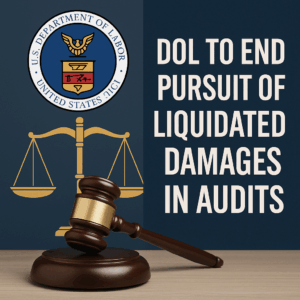In a significant development for wage and hour enforcement, the U.S. Department of Labor’s Wage and Hour Division (“WHD”) announced that it will no longer pursue liquidated damages in administrative enforcement proceedings under the Fair Labor Standards Act (“FLSA”). This change, issued on June 27, 2025, in Field Assistance Bulletin (“FAB”) 2025-3, signals a narrowed interpretation of the WHD’s statutory authority and alters how employers across the country, especially in Florida, should approach federal wage audits.
For years, the WHD has used its audit authority not only to recover unpaid wages but also to demand an equal amount in liquidated damages, effectively doubling the liability for employers even before a case reached court. Under this new guidance, the WHD is now restricted to supervising the payment of unpaid minimum wages or overtime pay. The agency  can no longer demand liquidated damages, also referred to as double damages, during administrative proceedings. This marks a shift in enforcement philosophy and may streamline how businesses resolve wage disputes with the agency.
can no longer demand liquidated damages, also referred to as double damages, during administrative proceedings. This marks a shift in enforcement philosophy and may streamline how businesses resolve wage disputes with the agency.
The decision to scale back enforcement follows years of fluctuating policy. In 2010, under the Obama administration, the WHD began seeking liquidated damages during audits. This was reversed in 2020 by the Trump administration, only to be reinstated by the Biden administration in 2021. Now, in 2025, the WHD has again adopted the more limited interpretation, asserting that Section 216(c) of the FLSA does not authorize liquidated damages during administrative matters. Instead, that authority exists only under Section 216(b), which governs court enforcement. While this may offer some relief to employers, it’s not a free pass. The WHD can still refer cases to the Department of Justice or file lawsuits directly in federal court, where liquidated damages and attorneys’ fees remain fully on the table. The risk of litigation has not gone away; it has merely shifted to a different stage in the enforcement process.
For Florida employers, this development presents both an opportunity and a warning. On one hand, businesses may find it easier and less costly to resolve wage violations through audits without the threat of additional penalties. On the other hand, ignoring audit findings or refusing to correct violations could still lead to expensive litigation. Now more than ever, employers must respond proactively to DOL audits by correcting payroll errors, documenting compliance efforts, and working with legal counsel to resolve disputes efficiently. The new FAB encourages this approach by removing a significant financial disincentive from the administrative process, which could lead to faster resolutions and less adversarial outcomes.
Employers should also consider conducting internal wage and hour audits to identify and correct compliance issues before they attract regulatory scrutiny. This includes reviewing overtime classifications, payroll practices, and timekeeping systems to ensure they align with FLSA standards. Businesses that rely on independent contractors or exempt employees should be especially vigilant, as misclassification is one of the most common sources of WHD audits. Human resources personnel and managers involved in wage-related decisions should receive updated training to stay current with evolving legal standards. Legal counsel can help employers assess risks, develop documentation protocols, and address any historical issues that could raise red flags in a future audit.
Notably, while liquidated damages are no longer available during audits, they remain fully available in court. In some cases, failure to cooperate with the WHD or demonstrate good-faith compliance can increase the likelihood of litigation and lead to harsher outcomes. Therefore, employers should not delay or downplay the seriousness of wage and hour audits. Addressing violations early, while liquidated damages are off the table, may help businesses avoid long-term costs and reputational damage.
In conclusion, FAB 2025-3 significantly reshapes how the Department of Labor approaches wage enforcement, eliminating one of the most punitive elements of administrative proceedings. For employers, this change opens the door to more cost-effective resolutions, but only if they act decisively and in good faith. Those who ignore audit findings or delay corrective action may still find themselves in court, facing the full spectrum of FLSA penalties. Now is the time for Florida employers to review their wage practices, consult legal counsel, and take proactive steps to ensure compliance.
If your business is facing a WHD audit or you want to proactively review your wage practices, our employment law team at Hoyer Law Group can help. We offer compliance audits, policy review, and strategic guidance to help you avoid penalties and litigation. Contact us today to schedule a confidential consultation.


